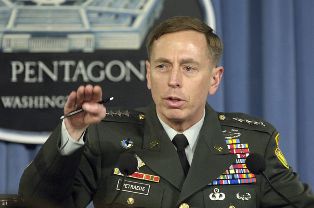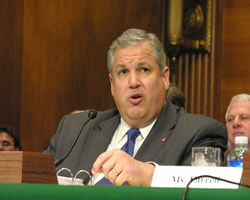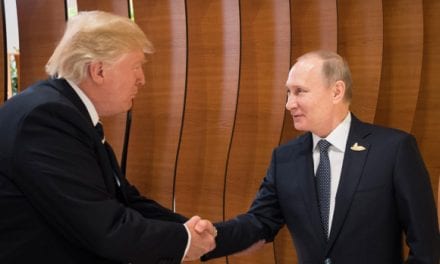By Sari Horwitz and Greg Miller,
The collapse of the dazzling career of CIA Director David H. Petraeus was triggered when a woman with whom he was having an affair sent threatening e-mails to another woman close to him, according to three senior law enforcement officials with knowledge of the episode.
The recipient of the e-mails was so frightened that she went to the FBI for protection and help tracking down the sender, according to the officials. The FBI investigation traced the threats to Paula Broadwell, a former military officer and a Petraeus biographer, and uncovered explicit e-mails between Broadwell and Petraeus, the officials said.
When Petraeus’s name first surfaced, FBI investigators were concerned that the CIA director’s personal e-mail account had been hacked and security had been breached. But the sexual nature of the e-mails led them to conclude that Petraeus and Broadwell were engaged in an affair, the officials said.
The identity of the woman who received the e-mails was not disclosed, and the nature of her relationship with Petraeus is unknown. The law enforcement officials said the e-mails indicated that Broadwell perceived the other woman as a threat to her relationship with Petraeus.
Attempts to reach Broadwell and her relatives have been unsuccessful, and she has not made a public statement since she was linked with Petraeus on Friday.
All three senior officials who described the impetus for the investigation spoke on condition their names be withheld because aspects of the inquiry are ongoing.
Petraeus, a retired four-star Army general who was once seen as a potential presidential candidate, said Friday that he was resigning as CIA chief because he had been involved in an extramarital affair. He has been married for 37 years and has two children.
Broadwell is married and also has two children.
In an e-mail message sent to a longtime friend Friday night, Petraeus expressed regret for letting down his family — and the nation. The friend, who described the contents of the message on the condition of anonymity, said Petraeus conveyed profound remorse in the message.
“He was deeply sorry for the pain he has caused his family,” the friend said. “He also noted how much he loved his job at the agency. He said he really relished the intellectual challenge there.”
The timing of the resignation has caused a controversy, with members of Congress and others questioning why the disclosure was not made until after Tuesday’s election. Some have also complained that the FBI did not notify the White House and senior members of Congress earlier that the CIA director was under investigation.
The law enforcement officials did not provide an exact timeline for the investigation, but they said that the inquiry started at least several weeks ago. They said investigators thought they were dealing with a routine harassment case until they discovered the e-mails were traced to a private e-mail account belonging to Petraeus.
The initial concern was that someone had broken into the CIA director’s e-mail account, leading to concerns about potential security breaches, according to the officials. As the investigation proceeded and more e-mails emerged, along with Broadwell’s role, FBI investigators realized they had uncovered an affair between Petraeus and Broadwell, the officials said.
The investigators first interviewed Petraeus about two weeks ago, the officials said. Petraeus was told at the time that no criminal charges would be forthcoming and the idea of him resigning was not raised, the officials said.
One of the law enforcement officials said Justice Department officials were unclear on what steps to take next because they had determined that there had been no crime and no breach of security.
It was not until Tuesday that the Justice Department notified James Clapper, the director of national intelligence, that compromising material about Petraeus had been uncovered as part of an investigation, according to a senior intelligence official. Clapper then spoke with Petraeus and told him to resign.
“Director Clapper learned of the situation from the FBI on Tuesday evening around 5 p.m.,” the intelligence official said. “In subsequent conversations with Director Petraeus, Director Clapper advised Director Petraeus to resign.”
The official declined to say whether Petraeus had considered resigning at that point, but he said it was quickly clear to Clapper that stepping down was “the right thing to do” for Petraeus.
The official said that Clapper has been fully briefed on all aspects of the FBI investigation and has not called for the DNI or CIA to conduct a follow-on probe or damage assessment — indicating that Clapper does not see the case as a security threat.
“There are no investigations beyond” that initiated by the FBI, the intelligence official said, speaking on condition of anonymity because of the sensitivity of the matter.
The official also would not address why the DNI and others weren’t notified of the FBI investigation — and its link to Petraeus — earlier.
“This is a very personal matter, not a matter of intelligence,” the official said. “There are protocols for this. I would imagine things have to cross a certain threshold before they are reportable.”
Clapper told the White House late Wednesday and no action was taken until Thursday morning, when Obama was informed. Petraeus came to the White House later on Thursday and offered his resignation. The president accepted it Friday



















